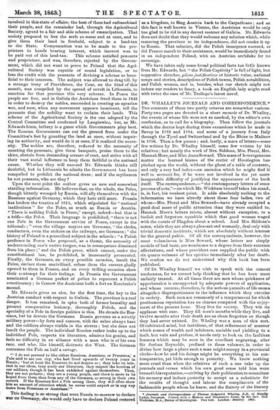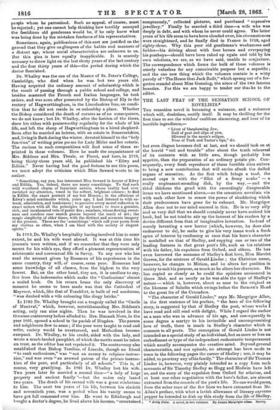DR. V/HALLEY'S JOURNALS AND CORRESPONDENCE.* THE contents of these two
portly octavos are somewhat various. Forty-two pages are devoted to a short memoir of Dr. Whalley, the events of whose life were not so marked, by the editor's own confession, as to call for a biography. Then follow the journals which the doctor kept during three excursions which he made in Savoy in 1783 and 1784, and notes of a journey from Italy- through the Tyrol and Switzerland and by the Rhine to Malines in 1786. Then a few poems ; and, lastly, a mass of letters—some few written by Dr. Whalley himself, some few written by his relatives ; but mostly the work of Mrs. Siddons, Mrs. Piozzi, Mrs.. Hannah More, and Miss Anna Seward. This mass of heterogeneous. matter the learned leisure of the rector of Horsington has pitched upon the world, without the ghost of a table of contents,. and only a very bad index—an omission which be might find it well to account for, if he were not involved in the yet more insuperable difficulty of justifying the appearance of the book itself. The correspondence,—" the contemporary letters of some persons of note,"—on which Mr. Wickham himself takes his stand,. is, in fact, his weakest point. It adds absolutely nothing. to the information we have already about these four ladies, two of whom—Mrs. Piozzi and Miss Seward—have already occupied a good deal more of public attention than they were entitled to.. Hannah More's letters relate, almost without exception, to a foolish and forgotten squabble which that good woman waged with the curate of Blagdon about a school. And Mrs. Siddons's notes, while they are always pleasant and womanly, deal only with trivial domestic incidents, which are absolutely without interest for the general public. Of all the correspondents, however, the- most voluminous is Miss Seward, whose letters are simply models of bad taste, are wearisome to a degree from their extreme affectations, and whose provident care supplied the public with six quarto volumes of her epistles immediately after her death.. We confess we do not understand why this book has been published.
Of Dr. Whalley himself we wish to speak with the utmost tenderness, for we cannot help thinking that he has been most unfairly treated. At all times there are men whose quickness of apprehension is unsupported by adequate powers of application, and whose success, therefore, in the serious pursuits of life seems altogether disproportionate to the influence which they exercise in society. Such men are commonly of a temperament for which posthumous reputation has no charms compared with the enjoy- ment of the present hour. They live for society. They win its. applause with ease. They fill men's mouths while they live, and twelve months after their death are as clean forgotten as though they had never existed. Dr. Whalley was a man of this sort. Of cultivated mind, but fastidious, of that refinement of manner which comes of wealth and indolence, amiable and yielding to a fault, but vain and profuse, it needs only to look on the faultless features which may be seen in the excellent engraving, after Sir Joshua Reynolds, prefixed to these volumes, in order to. divine how large a place such a man might occupy in a provincial circle—how he and his doings might be everything to his con- temporaries, yet little enough to posterity. We know nothing more cruel than when the relatives of such a one rake up the journals and verses which his own good sense told him were beneath his reputation,—striving by their publication to resuscitate his memory and induce posterity to accept as a substitute for the results of thought and labour the compliments of the fashionable people whom he knew, and the flattery of the literary * Journals end Correspondence of Thomas Sedgewick Whalley, DD, of Kant* Lodge, Somerset. Edited, with a Memoir and illustrative Notes, by the Rev. HSI Wickham, MA., Rector of Horsington. Two vols. London : Bentley. 1003.
people whom he patronized. Such an appeal, of course, must be rejected ; yet one cannot help thinking how terribly annoyed the fastidious old gentleman would be, if lie only knew what was being done by the mistaken fondness of his representatives.
Sometimes, again, publications of this sort are justified on the ground that they give us glimpses of the habits and manners of a distant age, whose social characteristics are unknown to us. But this plea is here equally inapplicable. It is scarcely ncessary to throw light on the last thirty years of the last century and the first thirty years of this—the period during which the doctor flourished.
Dr. Whalley was the son of the Master of St. Peter's College, Cambridge, who died when be was but two years old. Having acquired the ordinary amount of scholarship which is the result of passing through a public school and college, and besides mastered the French and Italian languages, he took orders, and was soon after presented by the Bishop of Ely to the rectory of Hagworthingham, in the Lincolnshire fens, on condi- tion that he did not reside in so unhealthy a place. Whether the Bishop considered the death of curates as of no consequence, we do not know ; but Dr. Whalley, after the fashion of the times, drew his tithes with praiseworthy regularity for the whole of his life, and left the sheep of Hagworthingham to a hired shepherd. Soon after he married an heiress, with an estate in Somersetshire, and, living in Bath during the winter, devoted himself to the "holy function" of writing prize poems for Lady Miller and her coterie. The curious in such compositions will find some of these re- printed in these volumes. Here he made the acquaintance of Mrs. Siddons and Mrs. Thrale, or Piozzi, and here, in 1779, being thirty-three years old, he published his " Edwy and Edilda." Never having had the good fortune to see this poem, we must adopt the criticism which Miss Seward wrote to its author.
"Something, say you, has interested Miss Seward in favour of Edwy and Edilda. Yes, indeed, there are many somethings. To find each wild woodland charm of luxuriant nature, whose reality had ever ravished my attention, toned in the softest, brightest colours ; to find in Edilda the exact portrait of my lost Honors.; in the effusions of Edwy's mind sentiments which, years ago, I had listened to with es- teem, admiration, and tenderness ; to perceive every moral reflection in exact unison with all the principles of my heart ; to trace a genuine, rich, and inexhausted vein of poetic fire ; numbers, whose flowing sweet- ness and careless ease snatch graces beyond the reach of art ; the magic simplicity of elder times, with the distinct and accurate imagery of the present. These are the ' somethings ' which call your poem from my shelves so often, when I am blest with the society of elegant spirits."
In 1783, Dr. Whalley's hospitality having involved him to some extent, he and his wife went abroad. It was at this time his journals were written, and if we remember that they were only meant for his wife's eye, they afford a pleasant representation of aristocratic and conventual life in Savoy. To any one who has read the account given by Rousseau of his experiences in the same country, they will, of course, seem poor. Rousseau had some knowledge of all classes, from the highest to the very lowest. But, on the other hand, they are, it is needless to say, free from the indecencies which make the "Confessions" almost a sealed book. On his return home the only discovery of moment he seems to have made was that the Cathedral of Mayence, which, like that of Frankfort, is built of red sandstone, .4 was daubed with a vile colouring like dingy bricks."
In 1799 Dr. Whalley brought out a tragedy called the "Castle of Montval," which, however, notwithstanding Mrs. Siddons's acting, only ran nine nights. Then he was involved in the tiresome controversy before alluded to. Mrs. Hannah More, in the year 1801, opened a school in the parish of B]agdon. The parson and neighbours flew to arms ; if the poor were taught to read and write, society would be overturned, and Methodism become ..rampant. Dr. Whalley, to his credit, sided with the lady, and wrote a much-lauded pamphlet, of which the merits must be taken on trust, as the editor has not reprinted it. The controversy also established that Bishop Tomline, of Lincoln, though no friend "to rank enthusiasm," was "not an enemy to religious instruc- tion," and was even "an avowed patron of the private instruc- tion of the poor, and particularly of all schools." This is, of course, very gratifying. In 1801 Dr. Whalley lost his wife. Two years later he married a second time—" a lady of large property and ancient family "—but the union only lasted two years. The death of his second wife was a great misfortune to him. The next ten years of his life, between his sixtieth and seventieth year, was a period when his vanity seems to have got full command over him. He went to Edinburgh and bought a doctor's degree, he lived above his income, " entertained , sumptuously," collected pictures, and purchased "expensive jewellery." Finally he married a third time—a wife who was deeply in debt, and with whom he never could agree. The latter years of his life seem to have been clouded over, his circumstances were straightened, and he finally died in France in 1828, aged eighty-three. Why this poor old gentleman's weaknesses and foibles—his driving about with four horses and overpaying his postboys—should have been raked up again and told by his own relations, we are, as we have said, unable to conjecture. The correspondence which forms the bulk of these volumes is utterly valueless for any conceivable purpose but a soporific ; and the one new thing which the volumes contain is a witty parody of "The House that Jack Built," which sprang out of a for- gotten scandal about Miss Gunning, the niece of the two famous beauties. For this we are happy to tender our thanks to the editor.































 Previous page
Previous page